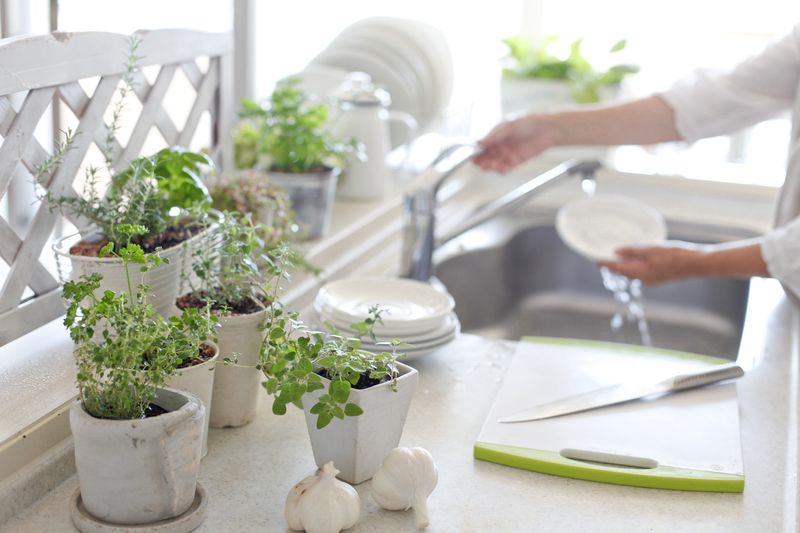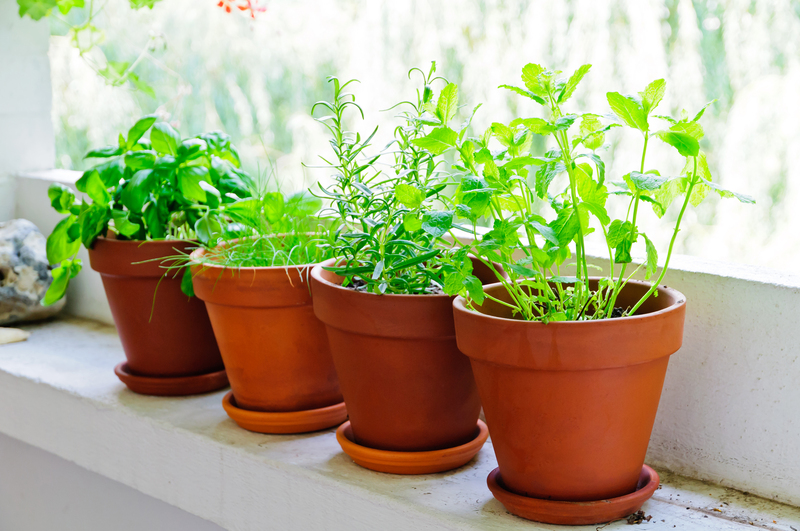Enriching Gardens by Transforming Organic Materials to Soil
Posted on 26/08/2025
Enriching Gardens by Transforming Organic Materials to Soil
Transforming organic materials into soil is a centuries-old technique that lies at the core of sustainable and thriving gardens. By using organic waste and natural processes, gardeners can not only minimize waste but also maximize the health and productivity of their gardens. This comprehensive guide explores diverse ways of enriching gardens by turning kitchen scraps, plant debris, and other organic matter into fertile, life-giving soil. Whether you are new to gardening or a seasoned green thumb, learning how to transform organic materials into soil will allow you to grow more vibrant plants, enhance biodiversity, and contribute positively to the environment.
Why Transform Organic Materials into Soil?
Many gardeners overlook the vast reservoir of nutrients hidden within garden and kitchen waste. Every year, tons of organic material is discarded, filling landfills and contributing to environmental problems like methane emissions. By converting organic matter into rich soil, you:
- Reduce landfill waste and environmental impact
- Enrich your garden soil naturally
- Save money on commercial fertilizers
- Encourage beneficial soil organisms
- Enhance plant health and crop yields
- Promote long-term soil fertility and resilience
Transforming organic materials into healthy, living soil is the most sustainable method of garden enrichment.

Understanding Organic Materials & Their Journey to Soil
Organic materials include anything that was once alive: leaves, grass clippings, fruit and vegetable peels, eggshells, coffee grounds, shredded paper, and more. When these materials are properly processed, their nutrients are released, becoming available to plants and the rich web of microorganisms in your garden.
The Process of Transformation
The journey from organic waste to nutrient-dense soil is often called composting. Composting harnesses natural decomposition processes, occurring with the help of microbes, fungi, worms, and insects. The end product--called compost or humus--is a dark, crumbly, earthy-smelling substance prized by gardeners for its ability to enrich soil and support plant growth.
Important Variations of the Main Topic:
- Transforming food scraps and yard waste
- Building fertile garden soil from organic matter
- Recycling organic material for healthy gardens
- Improving garden beds by organic conversion
Benefits of Enriching Gardens with Soil Made from Organic Materials
There's a growing movement towards regenerative gardening and farming techniques that emphasize soil health. When you enrich gardens by transforming organic matter into soil, you unlock numerous benefits:
- Improved Soil Structure - Compost adds organic matter, creating air pockets for roots and enhancing drainage and water retention.
- Nutrient Boost - Compost releases a slow, steady stream of essential nutrients, including nitrogen, phosphorus, and potassium.
- Disease Suppression - Rich, biologically active soils help suppress soilborne pathogens and pests.
- Stimulating Soil Life - Organic amendments feed earthworms and beneficial microbes, increasing biodiversity below ground.
- Reducing the Need for Chemicals - Healthy, compost-rich soils reduce dependence on synthetic fertilizers and pesticides.
- Climate Resilience - Better water retention and structure helps gardens withstand droughts, floods, and temperature extremes.
With regular additions of quality compost, gardens become more fertile, resilient, and productive--while also protecting our planet.
Popular Methods of Transforming Organic Materials to Soil
There are several proven methods to convert organic matter into garden-enriching soil. Selecting the right approach depends on your space, materials, garden type, and goals.
1. Traditional Composting
Traditional backyard composting involves layering "greens" (nitrogen-rich materials like grass clippings and vegetable scraps) and "browns" (carbon-rich materials like leaves and straw), then managing moisture and aeration. Over weeks or months, microorganisms break down the pile, yielding dark compost ideal for mixing into flower beds, vegetable patches, and around trees and shrubs.
- Use a minimum pile size of 3x3x3 feet to retain heat and moisture.
- Turn the pile every few weeks to aerate and speed decomposition.
- Keep the pile moist, like a wrung-out sponge.
2. Vermicomposting (Worm Composting)
Vermicomposting is the process of using red wiggler worms to break down food scraps and bedding. This method is ideal for small spaces such as patios, balconies, or even indoors.
- Worm castings are incredibly rich in nutrients and beneficial microbes.
- Worm bins require little maintenance and don't smell if managed properly.
3. Trench Composting
This simple method involves digging trenches directly in your garden, filling them with organic waste, and covering them back up with soil. Over time, the materials decompose below ground, enriching the garden beds where you plant the following season.
- Great for rotating kitchen scraps between rows or around fruit trees.
- No turning or special bin is needed.
4. Sheet Mulching (Lasagna Gardening)
Sheet mulching is layering organic materials like cardboard, leaves, grass, and compost directly on garden beds. Over months, the layers break down in place, creating fertile, fluffy soil with little effort.
- Ideal for starting new garden beds or rejuvenating tired lawns.
- Suppresses weeds and retains moisture.
5. Bokashi (Fermentation Composting)
Bokashi composting uses effective microorganisms (EM) to ferment food waste in airtight buckets, allowing even meat and dairy scraps to be processed safely. The pre-composted material can then be buried and completes decomposition in the soil, bringing nutrients right to the root zone.
- Minimal odor, fast results, suitable for urban gardeners.
- Reduces methane emissions compared to landfill disposal.
Best Organic Materials for Soil Enrichment
To enrich your gardens by transforming organic materials into soil, you need to know what materials are best and how to balance them:
- Kitchen Scraps: Vegetable peels, fruit cores, coffee grounds, eggshells, tea bags
- Yard Waste: Leaves, grass clippings, deadheaded flowers, small branches (chopped)
- Paper & Cardboard: Shredded newspaper, cardboard (plain, not glossy or colored), paper towels
- Manures: Well-aged manure from herbivores like cows, horses, rabbits, and chickens
- Other: Sawdust (from untreated wood), wood chips (in moderation), coconut coir
*Avoid adding: Meat, dairy, fats, oily foods, diseased plants, pet waste, and glossy paper, as these can attract pests or transmit pathogens.
Balancing "Greens" and "Browns"
For optimal composting results, maintain the right carbon-to-nitrogen ratio (C:N), aiming for roughly 25-30 parts carbon ("browns") to 1 part nitrogen ("greens"). Too much green leads to smelly, soggy piles; too much brown slows decomposition.
Step-By-Step Guide to Transforming Organic Material Into Rich Soil
- Set Up Your Site - Choose a location for your compost pile, bin, worm box, or trenches. Ensure it has good drainage and easy access.
- Gather Materials - Collect a mix of green and brown organic matter. Chop or shred larger pieces for faster breakdown.
- Layer Wisely - If using a compost pile or bin, alternate thin layers of green and brown material. For sheet mulch, layer cardboard, browns, and then greens.
- Moisten - Sprinkle each layer to maintain moisture throughout, but avoid saturating.
- Aerate - Turn your pile or provide ventilation (not needed in trench or worm composting) to supply oxygen to decomposers.
- Monitor and Maintain - Check moisture and adjust as needed. If it smells bad, add more browns. If it's too dry, add water or greens.
- Harvest the Compost - In 2-12 months (depending on method), the compost will be ready: dark, crumbly, and earthy-smelling.
- Apply to Your Garden - Mix compost into soil, top-dress beds, make compost tea, or use as mulch around plants.
Tips for Success in Enriching Garden Soil Organically
- Start small, but be consistent - Even a little compost goes a long way over time.
- Keep a covered kitchen scrap container for convenience and odor prevention.
- Avoid using diseased plant matter or weedy seeds unless you compost hot enough to kill pathogens.
- Let your finished compost "cure" for a few weeks before using it for seed starting or delicate plants.
- Share the abundance - Give extra compost to neighbors or community gardens.
- Observe your plants - Healthier, more resilient growth is a sure sign your soil is improving!
Common Challenges and How to Overcome Them
- Odors: Usually a sign of excess nitrogen or poor aeration. Add more browns and turn the piles.
- Pests: Avoid meat, dairy, and oils. Use bins with secure lids in urban areas.
- Slow decomposition: Materials may be too large or too dry. Chop more finely and add water.
Maximizing the Impact: Using Homemade Compost for Garden Enrichment
Once you begin using compost and organic-rich soil in your garden, you unlock incredible advantages:
- Soil amendment: Mix compost directly into planting holes or till across entire beds for vegetables, flowers, and shrubs.
- Mulching: Spread a layer of finished compost as mulch to conserve moisture and suppress weeds.
- Seed starting and transplants: Blend compost with sterile media for healthy, vigorous seedlings.
- Liquid fertilizer: Steep compost in water to make "compost tea"; use this to water or foliar-feed plants throughout the season.
Over time, your garden soil will become darker, looser, and teeming with worms and beneficial microbes--a true sign of living, healthy earth.
The Bigger Picture: Eco-Friendly Gardening for the Future
Enriching gardens by transforming organic materials to soil is more than a gardening practice--it's an act of environmental stewardship. This approach:
- Reduces waste and landfill overuse
- Mitigates climate change by sequestering carbon in soil
- Encourages regenerative cycles that support pollinators, birds, and other wildlife
- Builds stronger communities through sharing resources and knowledge
By turning kitchen and garden waste into fertile soil, you become a vital part of nature's endless cycle of growth, decay, and renewal. Every handful of compost you produce and use returns nutrients to the earth and adds resilience to your garden's future.

Frequently Asked Questions (FAQs)
- Can I compost in a small space? Yes! Worm bins, Bokashi, and trench composting are all compact options suited for balconies, patios, and even indoor spaces.
- How long does it take to create compost for the garden? Depending on the method, it can take anywhere from a few weeks (hot composting) to several months (cold composting or sheet mulching).
- Is compost safe for all plants? Absolutely. For delicate plants or seedlings, let compost cure longer or mix with other soil to avoid concentrated nutrients.
Conclusion: Grow a Thriving Garden by Transforming Organic Matter into Soil
Enriching your garden by transforming organic materials to soil is the ultimate way to build fertility, reduce waste, and foster true sustainability. By embracing composting, mulching, and other natural recycling methods, you create a living, vibrant foundation that supports plants, beneficial organisms, and the broader ecosystem.
Get started today by collecting your kitchen and yard waste, choosing a composting technique, and watching your garden transform. Your efforts will yield not only lush flowers and abundant harvests but also a healthier planet for generations to come.
Discover the magic of living soil--built by you, and enriching your garden for a lifetime.
Latest Posts
The Art of Securing Your Garden Plants in Cold Weather
Create Zen Vibes Outdoors with a Peaceful, Relaxing Garden
Comprehensive Guide to Perfecting Garden Seating Arrangements
Revolutionize Your Gardening Game with Essential Gear
Crafting Beautiful Gardens with Artful Hedge Trimming Techniques



